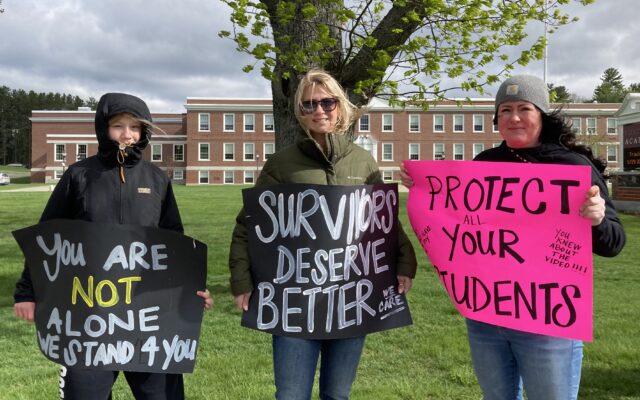
Protests show students and parents want schools to better respond to sexual assaults
By Lia Russell, Bangor Daily News Staff
A handful of suspected sexual assaults by Maine high school students in recent months have spotlighted students’ and parents’ dissatisfaction with how schools handle such reports, with many saying schools aren’t doing enough to keep student victims safe.
Two Foxcroft Academy students earlier this month were accused of sexually assaulting a classmate in February. The students have been charged with three counts of gross sexual assault. One of the accused is also charged with tampering with the victim and criminal threatening.
A petition to support the victim has circulated through the school community since the charges became public, and two Foxcroft Academy parents organized a walkout Wednesday to protest what they said was the school’s failure to protect students who report sexual assault. Those at the walkout criticized the school for not addressing the alleged assault publicly, though administrators have been aware of it since February.
The two accused students have not attended school in person since May 13, though a judge ruled that they were allowed to, provided they didn’t contact the victim or any witnesses. The school has said it had no input in the judge’s decision.
After becoming aware of the alleged assault, Headmaster Arnold Shorey said the school “followed protocols and educational laws,” and that the response would have been different if the alleged assault took place on campus.
The response in Dover-Foxcroft and in two other Maine school districts is indicative of a perception that schools have failed to adequately address sexual assault, leaving the burden of ensuring student safety on those who report such violence, according to Amanda Walsh, a lawyer at the Victims Rights Law Center in Boston, who litigates sexual assault cases at the K-12 and university levels.
“Students don’t want to report because it becomes a socially isolating experience especially [for] middle- and high-school students, [who] derive a lot of their social life from the time that they’re having lunch or transitioning between classes,” Walsh said.
But while schools are supposed to provide a means for students to report suspected sexual assaults and keep survivors of such violence safe, responding to sexual assaults can be complicated by schools’ obligation to follow other laws — such as a requirement to educate all students, maintain their privacy and come up with punishments that state laws allow, according to Walsh.
In February, students walked out of Medomak Valley Middle and High schools in Waldoboro to protest what they said were problems with how their district, Regional School Unit 40, handled sexual assault cases, including how victims of violence were supported and the severity of punishment for alleged perpetrators.
And in Brunswick, high school students walked out of their classrooms last week to demand better responses to sexual assault from administrators.
Maine public schools reported 19 incidents of sexual assault during the 2017-18 school year, according to the most recent data from the U.S. Department of Education’s Office of Civil Rights.
Complaints about how schools handle suspected sexual assaults and support survivors of sexual violence have been common since August 2020, when the U.S. Department of Education implemented new guidance for how schools should handle sexual assault reports, Walsh said.
K-12 schools are required to investigate all allegations of sexual assault, though they are not required to hold hearings at the end of an investigation, unlike colleges and universities, she said.
However, “it has not been our experience that those are followed, even though those regulations have been in place now for 18 months,” Walsh said.
Instead, schools have deferred to law enforcement to investigate reports of sexual assault.
“Over the last 10 years, we see that our response that we get from districts is, ‘This has been reported to law enforcement and they’re handling it,’” Walsh said. “They still have an obligation to respond.”
It’s standard practice for schools to report sexual assault to law enforcement as a crime and for complainants to file a Title IX complaint, said Marcus Mrowka, a Maine Department of Education spokesperson. Title IX is the federal law that prohibits sex discrimination at any school receiving federal funding. Under Title IX, schools need to have a way for students to report suspected sexual assaults and to support survivors.
Another avenue is for the complainant to file an education discrimination complaint under the Maine Human Rights Act, Mrowka said.
What further complicates things for public schools is their duty to educate all students, including those accused of sexual assault, Walsh said. Federal law also requires schools to protect students’ privacy, something schools have sometimes used “to shield themselves” from accountability in handling sexual assaults, she said.
State-specific school discipline laws also limit the amount of time students can be suspended or the grounds on which they can be suspended or expelled, Walsh said.
“Reconciling those laws with Title IX has been really difficult for school districts,” she said.
If you or someone you know needs resources or support related to sexual violence, contact the Maine Coalition Against Sexual Assault’s 24/7 hotline at 800-871-7741.